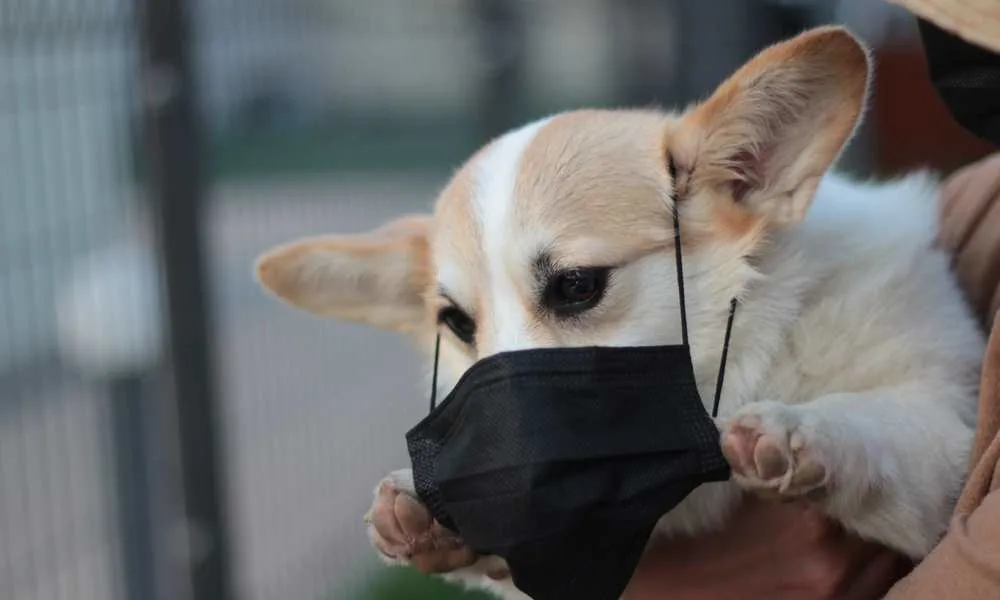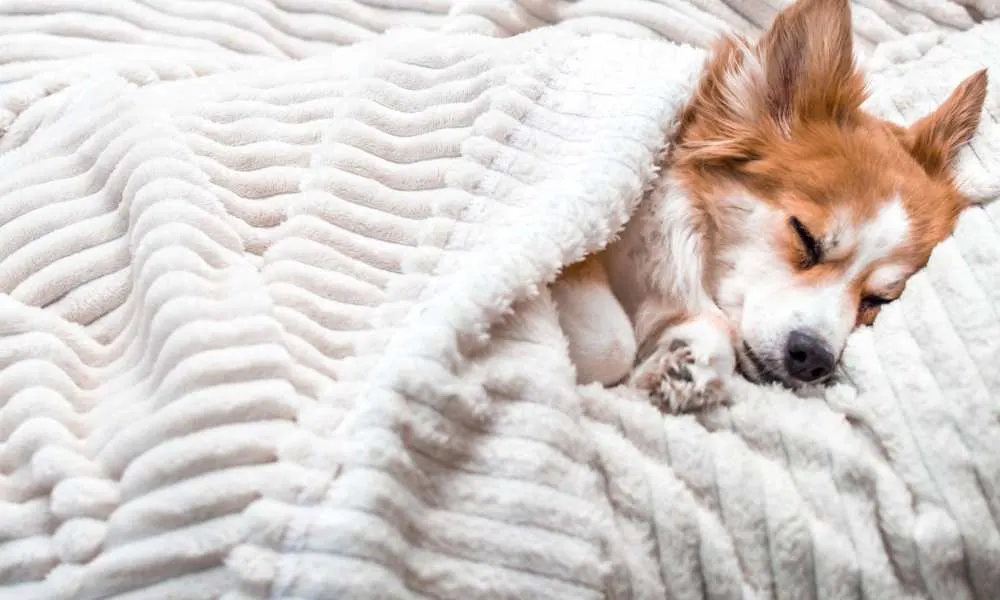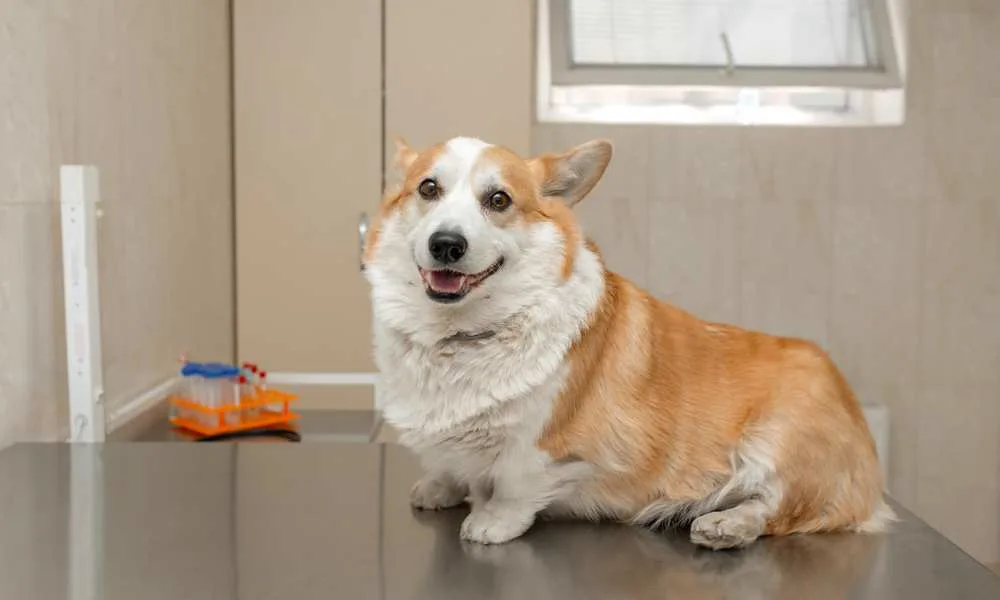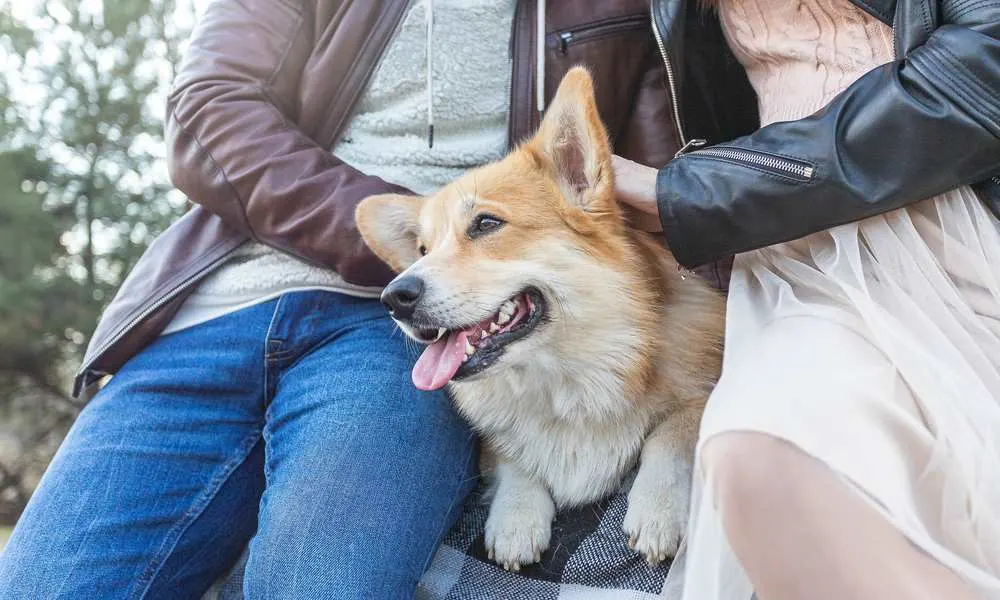Your dog can get exhausted from running around all day, and you can notice that he has trouble breathing. They all like to run, but not all of them are the “athletic type”. While some can last the entire day jumping around without taking a break, others are worn out after a couple of hours.
Let’s take the corgi breed, for example. They are a fascinating breed because they do not seem to be athletically built, but they need a lot of exercise on a daily basis to stay fit. Your corgi has much more energy than you think, but at a split second, you might ask yourself – why do corgis breathe fast? Aren’t they used to running around all day?
If you are concerned about your corgi’s rapid breathing and might think that this has something to do with their health, continue reading this article, and by the end, you will surely find the answers to all of your questions.

The Main Reasons Corgis Breathe Faster Than Usual
If you have found yourself wondering why does my corgi breathe so hard – the answer to this question doesn’t always have to be scary. Dogs, especially corgis, get excited quickly and start panting when they are really happy.
You’d be surprised by the list of reasons that cause your corgi to breathe faster than usual. A majority of them are everyday life situations, and if you can identify with at least one of them, your corgi is safe.
Let’s list them one by one:
- When they are around new people
- When they have been playing for a longer time
- When they feel overly excited about something
- When they are around loud situations like fireworks, firecrackers, thunder
- When they stick their head out the window while traveling
- When they go hiking and reach a certain altitude
- During summer when the temperatures are higher than usual
So, the next time you see your corgi breathe heavy, you shouldn’t hit the panic button right away. Stop for a second to find a logical explanation for it – like the ones we have just listed above. If that is the case – slow down your corgi and allow him some time to rest.
He will be back to running around in no time, and you have nothing to worry about.

Something More Serious When Corgis Breathe Heavy
We would all love for the answer to the question “why do corgis breathe fast” to be “because they are excited”, but unfortunately, it is not always like that. Besides these mild reasons for panting, lie a few more serious ones.
Among some serious reasons behind a dog’s panting we have:
- Heat stroke
- Heart failure
- Fluid in the lungs
- Anemia
- Onion poisoning
- Allergies
- Stress or anxiety
- Pneumonia
You can see that the list is not short at all, and we should explain each one in detail.
Here are the medical answers behind the question – why do corgis breathe fast?
| Heat stroke – Hyperthermia | Dogs use breathing as a way of cooling off from excessive heat. When they are in a room with a temperature above 104F or have been out for too long during a hot summer day – they will start to breathe heavily. This is a sign of hyperthermia. Your dog will begin to drool, show weakness and maybe even have a seizure. |
| Heart failure | Although the chances of this are rare, it can still happen to your dog. When a dog starts having heart problems, he will begin to breathe rapidly even though he hasn’t moved at all. This can be very dangerous if not treated right away – so rush your corgi to the doctor. |
| Fluid in the lungs | Naturally, there is not much fluid in your dog’s lungs when he is healthy. But, this can easily and quickly build up over time and cause your dog to breathe faster. Some of the most common symptoms of this are blue-colored gums and low body temperature. |
| Anemia | People are not the only ones who can have trouble with this tricky disease – dogs can be anemic. Although corgis are famous for their love for food, it can still happen. An anemic dog’s immune system suffers from a lack of red blood cells. This results in problems with oxygen getting to the lungs, and when that happens – your dog will struggle to breathe normally. |
| Onion poisoning | Some owners are famous for feeding their dogs anything, and everything – including some food meant only for human consumption. Onions fit into this category, and if your dog eats a lot of onions at once – he will start suffocating due to the bitterness of the onion. So be careful what you feed your pup! |
| Allergies | Your dog can be allergic to something he eats on a daily basis, and you might not have the slightest idea. This is why it is extremely important to do allergy tests while he is still a puppy. Allergic reactions can vary, from swelling to rashes and heavy breathing. |
| Stress or anxiety | Corgis are very affectionate dogs, and they love to be around their owner almost 24/7. If your corgi becomes too attached to you, he might not take it well when you have to leave him. This can cause separation anxiety, which can be noticed by heavy breathing, aggressive behavior, etc. |
| Pneumonia | Pneumonia is a disease that involves heavy breathing with dogs. Various infections cause it and, in some cases, can lead to severe inflammation of the lungs. You will spot this disease if you notice weakness, fatigue, and fever with your dog. With this disease, you have to be on the watch out all the time. |

Degenerative Myelopathy (DM)
This canine disease is also known as chronic degenerative radiculomyelopathy (CDRM), which affects the dog’s spinal cord and results in chronic weakness and paralysis. But it is not the only problem it causes – it can also tamper with your dog’s respiratory system.
There are two stages with this disease:
- The early stage: the symptoms are usually arthritis, which occurs after hip dysplasia
- The late stage: the signs are weakness, wobbling, stumbling, etc.
How is degenerative myelopathy connected to the respiratory system, and are corgis heavy breathers?
According to a recent study, with dogs who have suffered from this in the long run – significant problems with the abdominal breathing pattern have been noticed. This was more frequent with the Pembroke Welsh breed, and it has resulted in absolute muscle respiratory paralysis. After some time, some dogs have died from respiratory failure.
That said, if you have discovered degenerative myelopathy with your corgi, he might become a heavy breather because of the difficulties this disease causes.
In order to analyze the breathing patterns, dogs were examined by being held in the right-lateral recumbency. During this time, videos of their breathing were recorded.
After thorough research, it was finally concluded that degenerative myelopathy in the late stages indeed leads to severe respiratory problems and complete lung failure. However, it is not yet determined how to minimize and prevent this disease from affecting the dog’s breathing.
Special tests can discover myelopathy, and there are two ways in which you can treat this disease:
- Non-surgical treatment: If you opt for this way of treating, you are presented with options such as painkillers, NSAIDs, steroid injections, physical therapy. Bear in mind that physical therapy will be the most painful for your dog, and the best way is to turn to NSAIDs – non-steroidal anti-inflammatory drugs.
- Surgical treatment: If you opt for this way of treatment, surgeries include Anterior Cervical Discectomy and Fusion (neck surgery), Spinal Decompression, etc. Although this treatment method might seem more complex than the previous one, it is much safer and will indeed produce better results.
When your dog is suffering from such a disease, it is very important that before you agree to do anything – visit the vet and listen to his advice because he knows what’s best for your dog.

Do Corgis Breathe Fast While Sleeping?
You and your corgi are both sitting in the living room, but he fell asleep. After some time – you notice that his breathing pattern has changed, and you might ask yourself – do corgis breathe fast while sleeping?
Is this something that is normal for this breed, or is there a problem you should look into?
There are actually two groups of reasons why this is happening, and while one is completely normal, the other one should cause concern and a visit to the vet.
Let’s get down to explaining.
Here are the natural reasons for your corgi’s heavy breathing while sleeping
- They might be dreaming about something either stressful or happy.
- Their bodies might be growing, and rapid breathing is part of the development.
You should know that even humans tend to breathe heavily while sleeping, so there is not much to worry about if this is not that frequent.
However, heavy breathing can be a warning that something else, more serious perhaps, is going on with your corgi. Here are some of the possibilities.
Your corgi’s belly might be swollen. Corgis love to eat, and if they eat a lot and lie down right after the meal and fall asleep, they can start to breathe heavily. This is because their organism didn’t have the chance to digest the food the way it should.
On the other hand, it can also happen with the loss of appetite, and this is definitely a sign for you to go to the vet and check it out.
Here are a few tips for to deal with your corgi’s heavy breathing while sleeping:
- You should be patient with your corgi.
- You should let them explore their own space.
- You shouldn’t put too much pressure on them to perform tricks.
- You shouldn’t raise your voice at them because they can get upset quickly.

DIY Test For Corgis
If you are an owner who is concerned for your corgi’s health, no matter what you might be inspecting, there is a physical test you can do by yourself without taking your corgi to the vet.
The test consists of:
- Examining the thorax
- Checking the dog’s skin
- Performing a turgor test
Let’s begin by explaining them one by one:
First, examining your dog’s thorax.
This includes checking your corgi’s neck and their breathing rate. The normal breathing rate for dogs is between 15-60 bpm. You can distinguish normal from abnormal breathing in dogs.
| Normal breathing: | Abnormal breathing: |
|---|---|
| Normal breathing pattern | Any unusual noise while breathing |
| Distinguishing every breath | A change in your dog’s bark |
| The chest wall is moving “in and out” | High pitched noises |
| The dog is calm | Sneezing, coughing, wheezing |
Next, we have checking your dog’s skin.
The skin and coat of your corgi is a very important indicator of whether he is healthy or not, and you can do this by distinguishing normal from abnormal skin:
| Normal skin: | Abnormal skin: |
|---|---|
| Shiny and smooth coat | Sparse of patchy coat |
| Skin is soft when you touch it | You feel lumps and bumps on the skin |
| Their is minimal or no odor at all | There are open wounds on the skin |
Lastly, we have the turgor test.
The so-called skin turgor test is one of the most effective ways to determine whether your dog is healthy or not, and it is very easy to perform.
All you have to do is take your corgi’s skin, pull it over the neck into a “tent,” and then release it quickly. If the skin goes back fast, your corgi is healthy. However, if the skin remains tented, then there is a good probability that your corgi might be dehydrated.
You don’t have to be a professional to do this test successfully – it is very easy to spot if there is something wrong. If this is the case, you shouldn’t turn a blind eye to your dog.
Go to the vet and get your corgi checked for any possible health threats – who knows what he might be dealing with.

Improving Your Corgi’s Skin
Since skin problems are almost as common as respiratory ones, there is no reason why you shouldn’t learn something more about this. Skin problems with corgis are often the result of unhealthy diets.
Feeding your corgi the wrong food can lead to:
- Slow healing of wounds
- Allergic reactions
- Respiratory issues
- Pain in the joints
- Excessive itching
- Internal inflammation
- Poor immune system
- Ear infections
As you can see, the list is not short at all, and you should know how to address this problem in a timely manner before it becomes something more serious.
Basically, all you have to do is put your dog on the right Omega-3 supplement diet. Don’t worry about this because most dogs love the taste of this.
These supplements are made from healthy anchovies – to provide your dog with all the essential oils and vitamins he needs.

Three Simple Ways To Keep Your Corgi In Good Shape
There are simple ways in which you can keep your corgi healthy and happy. This doesn’t include any strict medication or going to the vet every week – just love. Here are three simple ways in which you can keep your corgi in good shape:
1. Give your corgi something to do
Your corgi is a born herd dog, and sometimes all he needs to be happy is to have a sense of responsibility. This is why they are great at farms, where they are in charge of other animals.
2. Watch your corgi’s back
Although this is a metaphoric expression in most cases, you should really watch your corgi’s back because of their fragile health. They have a lot of energy and love jumping around. However, they can get easily injured – so keep your eyes wide open.
3. Spend time with your corgi
Corgis are extremely affectionate dogs, and they love spending time with their owner. There is no such thing as spending too much time with them – they will be happy just to be around you 24/7. Believe it or not, this is actually a source of health for them.
Read Also: Do Corgis Hiccup?

Conclusion
When it comes to fast breathing with dogs, there are numerous reasons – some are natural, and some are indicators that something serious might be happening.
As far as the corgi breed is concerned, some of the main reasons for their rapid breathing are: excitement when they are around new people, after playing for a long time, when they are around fireworks or thunder, or during summer when the temperature is high.
On the other hand, heavy breathing can be a sign of something a little bit serious. For example, notice that your corgi’s breathing pattern has changed. This could be a sign of some threatening diseases like: heart failure, heat stroke, anemia, onion poisoning, allergies, stress or anxiety, etc.
Degenerative myelopathy (DM) is a disease that affects the dog’s spinal cord, but it also leads to some respiratory problems. It has been determined by thorough research that this problem is more common with the Pembroke breed. There are two ways in which you can deal with this: surgically or non-surgically. But, before you do anything, make sure that you visit the vet.
It is true that corgi dogs breathe heavily while they are asleep, but this doesn’t have to mean that there is something wrong. They can simply be dreaming about something scary or happy. However, if you worry that there is something more to this, you can always do a DIY physical test by checking your dog’s breathing, examining their skin, or doing a turgor test.
In order to keep your corgi happy and healthy, you should give them some sense of responsibility, watch their back and spend time with them whenever you can.

